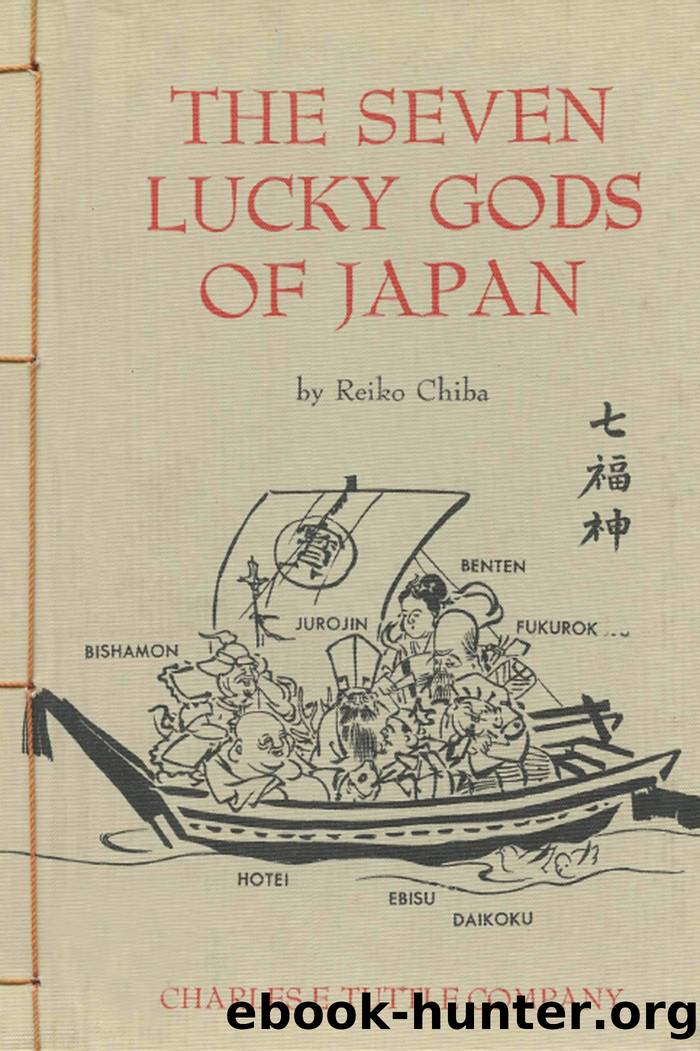Seven Lucky Gods of Japan by Reiko Chiba

Author:Reiko Chiba
Language: eng
Format: epub
Publisher: Tuttle Publishing
HOTEI
HOTEI is the god of fortune, guardian of children, patron of fortunetellers, wits, and bartenders. He is the god of popularity and magnanimity, and he is a big, full, fat, bald, smiling man with bristly whiskers. His "well developed corporation indicates inner wealth and largeness of soul. He carries a large bag over his shoulder which, according to belief, holds fortune for those who believe in his virtues.
Hotei was a true person. His name in Chinese was Kaishi. Although his birthday is unknown, the date of his death is March of the year 916. Even though Hotei was a zen priest, his looks and some of the things he did were pretty much against him. For one thing, he looked like a rogue and had no regular place to stay or sleep. Once he slept in an open field during a snow storm and people marveled when they saw that he did not get wet nor cold. He had a narrow forehead, and his huge belly always seemed to be protruding through his priests robes so that he always appeared half nude. This looked so funny to the Chinese people that they began to call him Cho-Tei-Shi or, Ho-Tei-Shi, which means "old cloth bag. " Although a priest, he was not above begging for either meat or fishâfoods strictly forbidden to priests.
Yet, for all of Hotei's dissipated appearance, he was a marvelous speaker and could elouently quote Buddhist texts and verses almost without stop. He was also a fortune teller and the things he predicted always came true. He would not however, tell anyone's fortune who did not want to know the absolute truth.
Many Western people believe the story about Hotei that if several strangers gather on New Year's Eve and if all ask Hotei for a gift and have strength in their belief that their request will be granted, Hotei will give them what they ask for. There is one stipulation; all must ask for the same gift.
Belief in Hotei by the Japanese began in the Edo era. The reason that Japanese have such a high regard for this god is that according to a legend, before Zen came to Japan, the world of mercy, a Buddhist belief would be brought to Japan by an unlikely looking priest who, in reality would be a manifestation of the Buddhist Kannon, Shi-Bosatsu, or Miroku. Miroku was the saint who would save those people who could not be saved through Buddha. This belief is rather complicated. Let us just say that Hotei is regarded as the Miroku of the legend.
Download
This site does not store any files on its server. We only index and link to content provided by other sites. Please contact the content providers to delete copyright contents if any and email us, we'll remove relevant links or contents immediately.
| Confucianism | Feng Shui |
| I Ching | Jainism |
| Karma | Shintoism |
| Sikhism | Tao Te Ching |
| Taoism | Tibetan Book of the Dead |
| Zoroastrianism |
The Tao of Physics by Fritjof Capra(2272)
Human Design by Chetan Parkyn(2068)
The Diamond Cutter by Geshe Michael Roach(2058)
Feng Shui by Stephen Skinner(1937)
The Alchemy of Sexual Energy by Mantak Chia(1855)
Tao Te Ching by Lao Tzu(1834)
365 Tao: Daily Meditations by Ming-Dao Deng(1616)
Tao Tantric Arts for Women by Minke de Vos(1592)
Sun Tzu's The Art of War by Giles Lionel Minford John Tzu Sun(1531)
Sidney Sheldon (1982) Master Of The Game by Sidney Sheldon(1512)
Buddhism 101 by Arnie Kozak(1508)
Karma-Yoga and Bhakti-Yoga by Swami Vivekananda(1489)
The Analects of Confucius by Burton Watson(1429)
The Art of War Other Classics of Eastern Philosophy by Sun Tzu Lao-Tzu Confucius Mencius(1412)
The Way of Chuang Tzu by Thomas Merton(1361)
Tao te ching by Lao Tzu(1356)
The New Bohemians Handbook by Justina Blakeney(1350)
The Sayings Of by Confucius(1312)
Bless This House by Donna Henes(1267)
